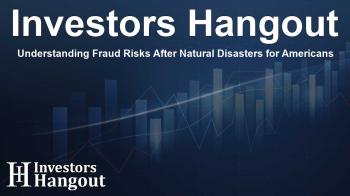Understanding Fraud Risks After Natural Disasters for Americans

The Impact of Natural Disasters on Fraud Risks
Natural disasters can have devastating effects on communities, and new data indicates they may also increase the likelihood of fraudulent activities. A recent survey by The Harris Poll highlights that a sizeable portion of Americans—specifically, thirty-seven percent—has fallen victim to scams after being personally or professionally affected by a disaster.
Types of Fraud Experienced
Respondents shared their experiences with various forms of fraud, painting a concerning picture of post-disaster vulnerabilities.
Common Fraud Scenarios
- Identity theft: 14%
- Government assistance fraud: 11%
- Loan scams: 11%
- Vendor fraud: 10%
- Utility scams: 10%
- Charity fraud: 10%
- Insurance fraud: 10%
- Contractor fraud: 8%
This alarming data emphasizes the need for heightened awareness and preventative measures. Notably, individuals in certain regions, particularly in the Northeast and South, reported higher rates of fraud, with 40% indicating they had been affected compared to only 31% in the Midwest.
The Need for Preparedness
As stated by Christine Cutti-Fox, Director of Forensic & Technology Advisory Services at AICPA, experiencing positive community behaviors is common during recovery, but the negative impact of fraud can undermine recovery efforts. It's crucial to remain vigilant and develop a detailed recovery plan, ensuring that documentation is in place to aid in navigating the aftermath.
Importance of Insurance Coverage
Interestingly, 48% of respondents reported that their personal insurance does not cover fraud-related losses during disaster recovery. This lack of support can leave individuals vulnerable. In contrast, 64% of business owners have insurance that includes fraud-related protection, signifying an essential aspect of safeguarding financial stability.
Cutti-Fox encourages everyone to consider fraud-related coverage as a financial safeguard. It serves to protect against unexpected fraudulent incidents, such as identity theft and employee dishonesty, thus emphasizing its importance.
Proactive Fraud Prevention Strategies
The AICPA offers valuable insights to prevent individuals and businesses from becoming further victims after disasters. Here are some key prevention tips:
- Research and keep reliable contractor information handy before a disaster strikes.
- Always verify the identity of any contractor, government official, or charity worker who approaches you.
- Request business licenses from contractors to confirm their legitimacy before hiring.
- Ensure written contracts are in place that clearly describe services, thus minimizing misunderstandings.
- Do not pay with cash or untraceable methods to avoid giving fraudsters an advantage.
- Be vigilant about price gouging; compare costs to avoid overpaying for services during crises.
- Verify the legitimacy of charitable organizations before making donations.
The Role of CPAs in Disaster Recovery
CPAs are essential in disaster planning and recovery, helping navigate the complex maze of financial challenges that arise during such times. They provide crucial resources for thorough disaster preparedness, tax relief, and recovery support. The AICPA offers tools tailored for both individuals and businesses to ensure they are well-equipped to deal with the aftermath of disasters while minimizing the risk of falling victim to fraud.
Frequently Asked Questions
What percentage of Americans have faced fraud after a disaster?
According to the survey, thirty-seven percent of Americans have reported experiencing fraudulent activities post-disaster.
What types of fraud are most commonly reported?
The most common types of fraud reported include identity theft, government assistance fraud, and loan scams, among others.
Is insurance adequate to cover fraud-related losses?
Many individuals lack adequate insurance, with 48% indicating their policies do not cover fraud-related losses during recovery.
What can be done to prevent fraud after a disaster?
Engaging in proactive measures, such as verifying contractors and being cautious with financial transactions, can help individuals avoid fraud.
How do CPAs support disaster recovery?
CPAs provide essential support through financial guidance, disaster preparedness tools, and recovery resources tailored for individuals and businesses.
About The Author
Contact Henry Turner privately here. Or send an email with ATTN: Henry Turner as the subject to contact@investorshangout.com.
About Investors Hangout
Investors Hangout is a leading online stock forum for financial discussion and learning, offering a wide range of free tools and resources. It draws in traders of all levels, who exchange market knowledge, investigate trading tactics, and keep an eye on industry developments in real time. Featuring financial articles, stock message boards, quotes, charts, company profiles, and live news updates. Through cooperative learning and a wealth of informational resources, it helps users from novices creating their first portfolios to experts honing their techniques. Join Investors Hangout today: https://investorshangout.com/
The content of this article is based on factual, publicly available information and does not represent legal, financial, or investment advice. Investors Hangout does not offer financial advice, and the author is not a licensed financial advisor. Consult a qualified advisor before making any financial or investment decisions based on this article. This article should not be considered advice to purchase, sell, or hold any securities or other investments. If any of the material provided here is inaccurate, please contact us for corrections.

